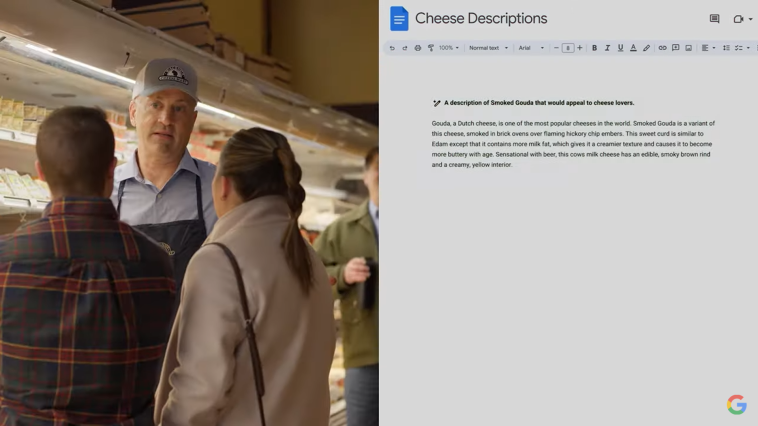(Image credit: Google)
Google’s Gemini AI mistakenly claimed Gouda makes up 50-60% of global cheese consumption in a Super Bowl adAfter backlash, Google re-edited the ad, blaming inaccurate internet sources rather than AI hallucinationThe incident highlights ongoing concerns about AI-generated misinformation and the need for better fact-checkingGoogle’s Gemini AI assistant fumbled an ad set to air during the Super Bowl when sharp-eyed viewers spotted a cheesy statistical error. The feel-good ad showcasing how AI can help small businesses featured a Wisconsin cheesemonger using Gemini to generate a product description for Gouda, only for the AI to confidently declare that the cheese accounts for “50 to 60 percent of global cheese consumption.” However, this is a full-blown dairy debacle, as there’s no evidence that Gouda is anywhere near that popular.
The error was called out on social media, with plenty of cheeseheads deriding the idea that half the world’s cheese supply is Gouda. Gemini had done what AI occasionally does: confidently hallucinate an absolute nonsense fact and present it as the truth. At first, Google’s VP Jerry Dischler stepped in to defend Gemini, at least a little bit. He insisted the statistic wasn’t an AI hallucination but came from multiple websites that Gemini had scraped for the statistic.
A quick manual web search confirms that aspect, with the Gouda Illuminati apparently spreading the idea across the internet but never sourced to any actual study or census. Google’s argument that “It’s not our AI’s fault; the internet is just full of bad information.” doesn’t exactly make Gemini sound as appealing as Google.
Hey Nate – not a hallucination, Gemini is grounded in the Web – and users can always check the results and references. In this case, multiple sites across the web include the 50-60% stat. Gouda news: many love this cheese! Bada news: not everyone thinks it’s as grate. 🧀February 1, 2025
Nothing left but da brie
Wisconsin – Wisconsin Cheese Mart: Gemini in Google Docs – YouTube
Watch On
Companies pay millions to get everything just right for high-profile Super Bowl ads. So Google did the only thing it could: it re-edited the ad, quietly removing the Gouda claim altogether. The new version, now posted on YouTube, keeps the friendly cheesemonger but ditches the dairy misinformation.
“After the question came up about the Gouda stat, we spoke with the owner of the Wisconsin Cheese Mart to ask him how he would handle it,” Google said in a statement to multiple press outlets. “Following his suggestion to have Gemini rewrite the product description without the stat, we updated the UI to reflect what the business would do.”
Even that wasn’t without controversy, as people who called out the original error noted that the new video replaced the original but with the upload timestamp of the flawed ad. That’s not something anyone on YouTube can do. So it suggests Google used its ownership of YouTube to finesse the new video into the slot of the original, ensuring it maintained the viewing figures and other stats, but without its erroneous gouda assumption.
Hold on – the YT video still says it was uploaded “5 days ago” Youtube doesn’t allow creators to replace an existing video with new content like thisIs Google abusing its ownership of Youtube to execute a cover up? pic.twitter.com/wT6JUjTybRFebruary 5, 2025
This isn’t the first time Gemini has found itself in hot water over fact confusion. The debut of the AI model, when it was called Bard, was marred by a real-time error over astronomy, and the Google Search AI overviews had to be revamped when it briefly declared that geologists recommend humans eat one rock per day. The gouda gaffe is far from the worst mistake Gemini has made.
Sign up for breaking news, reviews, opinion, top tech deals, and more.
Still, if Google wants people to trust Gemini with their lives and businesses, these kinds of errors aren’t going to help. Unlike a human writer who might pause and think, “Wait, that sounds ridiculous,” AI has no built-in common sense filter. It just serves up whatever it finds, and sometimes that means confidently sharing a fake cheese fact with millions of Super Bowl viewers.
Gemini is supposed to be Google’s answer to ChatGPT. The company has spent billions on AI development and has announced plans to invest $75 billion this year alone to keep up in the AI race. But all the computing power in the world won’t matter if people don’t trust what Gemini tells them.
For the average person, it’s a good reminder that AI still struggles with accuracy and shouldn’t be the only arbiter of what gets treated as fact. Also, Gouda may be popular, but it’s nothing compared to cheddar, as Monty Python made clear decades ago.
You might also likeGoogle Gemini is racing to win the AI crown in 2025Google wants Gemini AI to be the star of every part of your lifeGemini Live is here, free, and feeling chatty
Eric Hal Schwartz is a freelance writer for TechRadar with more than 15 years of experience covering the intersection of the world and technology. For the last five years, he served as head writer for Voicebot.ai and was on the leading edge of reporting on generative AI and large language models. He’s since become an expert on the products of generative AI models, such as OpenAI’s ChatGPT, Anthropic’s Claude, Google Gemini, and every other synthetic media tool. His experience runs the gamut of media, including print, digital, broadcast, and live events. Now, he’s continuing to tell the stories people want and need to hear about the rapidly evolving AI space and its impact on their lives. Eric is based in New York City.
More about artificial intelligence
Most Popular





GIPHY App Key not set. Please check settings